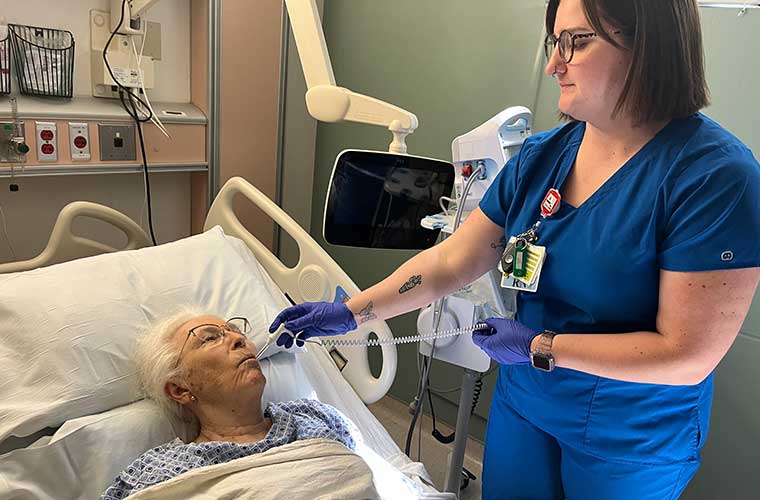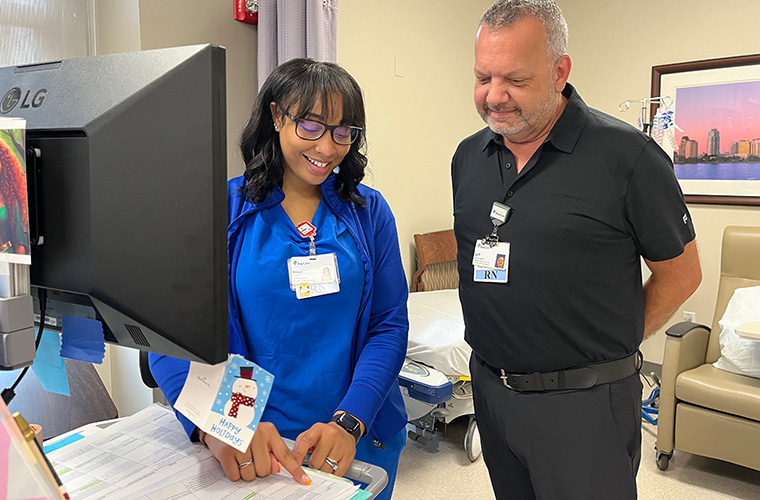BayCare Expands Procedure to Treat Bladder Cancer

The national shortage of a bladder cancer medication has led BayCare to expand a treatment to instill chemotherapy drugs directly into the bladder. The procedure began at one BayCare hospital and is now being developed for the entire health system across West Central Florida.
Jeff Raines, St. Anthony’s Hospital manager of oncology services and outpatient infusion, learned that intravesical chemo, a procedure in which chemotherapy medication is directly injected into the bladder to shrink tumors, was being used by urologists at Winter Haven Hospital. Raines began working to bring that process to St. Anthony’s Hospital and expand it to all BayCare infusion centers.
“I saw a need when our urology physicians were treating patients using Bacillus Calmette-Guérin (BCG), which is live bacteria, to help shrink bladder tumors,” Raines said. “However, there is a national shortage of BCG which was limiting the number of patients who could be treated. The next line of treatment is to instill chemotherapy into the bladder.”
Winter Haven Hospital urologists had been using the chemotherapy treatment with success, Raines said. After learning more about the procedure, he met with St. Anthony’s Hospital's urology team to help develop a plan to treat their patients in the hospital's outpatient infusion center.
“Since all outpatient infusion nurses must be chemo certified, this was the best arena to provide and expand this care,” Raines added. “We created a private place to carry out the procedure, developed a policy and trained our staff.”
During the procedure the nurse places a catheter into the patient’s bladder to drain urine. The nurse then instills chemotherapy through the catheter directly into the bladder.
“The patient must remain in the infusion center and hold the chemo in their bladder, typically for 1-2 hours,” Raines said. “The nurse then will unclamp the catheter and release the chemo into a collection bag. The catheter is removed, and the patient is discharged home.”
The treatment is performed weekly for a prescribed length of time. “It’s usually six to 12 weeks but that is determined by the physician.,” Raines noted.

llmi Mita was the first patient to receive this bladder cancer treatment at St. Anthony’s Hospital. Renata Mita, his wife, said that it was better for him to be able to receive the treatment in an outpatient setting. “It was very easy for us to go there and get the care he needed,” Renata Mita said.
“Jeff kept me up to date on how he was doing during the procedure,” she said. “Ilmi was diagnosed with bladder cancer in 2003, and since then has had surgery and different treatments including chemotherapy. This treatment has been very good.”
Barbara Sines, a former nurse from Connecticut, had received the BCG treatment in the past, but knew she would need something different now because of the BCG shortage. At her first treatment in early June at St. Anthony’s Hospital, she was a little nervous but pleased. “It’s convenient and similar to when I had the BCG treatment,” she said. “I’m glad I don’t have to go to Tampa.”
Sines was diagnosed with bladder cancer in August 2022, and had surgery the following month. “There’s no telling how long I walked around with this,” she said. “I consider myself blessed.”
“Jeff’s initiative is exactly how oncology services will be expanded throughout BayCare facilities,” said Tim McMahon, BayCare director of the oncology service line. “We can now provide this advanced treatment to more patients who are diagnosed with bladder tumors. I think our patients will benefit from this innovative procedure.”
Expanding intravesical chemo to outpatient infusion centers allows more patients to receive treatment in this way. “The urologists are the only other providers who do this service,” Raines said. “However, they only do it in the operating room. This way, more patients can be reached.”
Learn more about BayCare’s innovative approach to cancer care.
